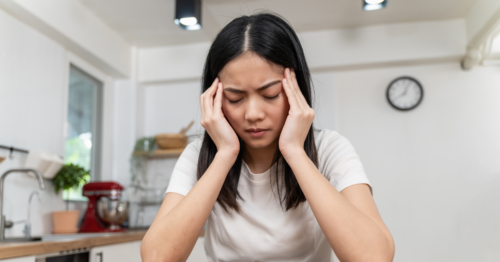
Table of Contents
Here’s Why You Feel Guilty for No Reason — and How to Cope

Written By: Sarah Fielding

Clinically Reviewed By: Clary Figueroa
November 20, 2024
4 min.
Excessive guilt can stem from a mental health condition such as an anxiety disorder, post-traumatic stress disorder, bipolar disorder, and more.
Learn more about our Clinical Review Process
Table of Contents
Some degree of guilt is a normal part of life. You might experience guilt around someone else, like if you said something rude, or you might feel internal guilt from ignoring obligations or skipping self-care. Apologizing and moving on should be simple, but if a guilty feeling appears much more intensely than the situation merits, there might be something else going on.
As Charlie Health Clinical Supervisor Sarah Lyter, LCPC, MA, says, “If it’s contributing to further mental or emotional struggles — like anxiety or excessive worry, preoccupied thoughts, mood swings, crying spells, depressed mood, emptiness or shame — then you’re experiencing guilt that may be exacerbated.” Read on to learn why you might feel guilty for no reason, when excessive guilt is a sign of a mental health condition, and how to cope with these feelings.

Support for when guilt is getting in the way of your mental health
Virtual treatment from the comfort of your home.
Why do I feel guilty for no reason?
Excessive guilt might indicate you’re experiencing a mental health condition. Otherwise, you might have symptoms that point to a disorder (which a mental health professional can accurately diagnose) or symptoms of one.
For example, you can experience anxiety without having an anxiety disorder, or it might stem from one of them, such as social anxiety disorder. Our goal at Charlie Health is to provide you with expert guidance on why you might be experiencing something and ways you can cope with it. So, let’s get into guilt.
How to tell if your guilt stems from a mental health condition
As Lyter explained, exacerbated unnecessary guilt can cause mental health symptoms like anxiety, mood swings, crying, and shame — to name a few. It can also indicate something more is going on when persistent guilt disrupts your daily functioning. Trouble functioning can include difficulty concentrating, sleep troubles, inability to care for your physical health, struggling to keep up with your responsibilities, and more. Experiencing these factors alongside persistent feelings of guilt can indicate you aren’t responding to it “in a healthy manner,” says Lyter.
Guilt is tied up with so many mental health disorders and events, including trauma. According to Lyter, mental and behavioral health disorders that include symptoms of guilt or shame include, but are not limited to:
- Depression
- Anxiety disorders
- Obsessive-compulsive disorder
- Post-traumatic stress disorder
- Bipolar disorder
- Eating Disorder
- Substance use disorders
- Personality disorders

It’s important to consider that your experiences partly inform how you process and respond to things, guilt included. If you grew up in an abusive home and you were told everything was your fault, then intense guilt can be a default. If you’ve been taught that perfection is the only option, then persistent guilt could appear anytime you veer from that by, you know, being human.
How to cope with feeling guilty
“This is a complex process that involves a lot of moving pieces, and it can be incredibly beneficial to work through these struggles with a licensed mental health professional,” says Lyter. This process might involve individual, group, or family therapy through techniques including cognitive behavioral therapy, dialectical behavior therapy, and eye movement desensitization and reprocessing. Each of these treatment modalities has benefits, depending on your experience and the care you want. Here’s an overview of these three options.
1. Cognitive behavioral therapy
Cognitive behavioral therapy (CBT) can help individuals living with:
- Mood disorders, including schizophrenia
- Major depressive disorder
- Anxiety disorders, such as generalized anxiety disorder and panic disorder
- Post-traumatic stress disorder (PTSD)
- Body and gender dysphoria
According to the National Institute of Mental Health (NIMH), “It teaches people different ways of thinking, behaving, and reacting to situations to help you feel less anxious and fearful. CBT has been well studied and is the gold standard for psychotherapy.
2. Dialectical behavior therapy
Dialectical behavioral therapy (DBT) was originally created to help individuals living with borderline personality disorder. Mental health professionals now also use it for:
- Major depressive disorder
- Substance use disorders
- Generalized anxiety disorder
- Self-harm
- PTSD
This therapeutic technique can help people improve their emotional regulation, embrace change, and avoid a black-and-white outlook on the world.
3. Eye movement desensitization and reprocessing
Eye movement desensitization and reprocessing (EMDR) was created to help individuals living with PTSD. According to the National Center for PTSD, “EMDR can help you process upsetting memories, thoughts, and feelings related to the trauma.” It can cause discomfort if a traumatic event is brought up, but it has been shown to be effective in reducing PTSD’s impact.
You might also choose to undergo trauma-informed care within your therapy experience if it’s relevant to your experience. According to the Substance Abuse and Mental Health Administration (SAMHSA), there are six principles for effective trauma-informed care:
- Safety
- Trustworthiness and transparency
- Peer support
- Collaboration and mutuality
- Empowerment, voice, and choice
- Cultural, historical, and gender issues
There are a range of steps you can take in and out of therapy to cope with and address guilty feelings. According to Lyter, it can be beneficial to:
- Identify and process underlying issues that contribute to guilt
- Challenge irrational and unhelpful thoughts and self-talk
- Practice self-compassion and affirmations
- Focus on what is within your control
- Build a support system
- Practice gratitude
- Engage in self-care
How Charlie Health can help
If guilt is getting in the way of your overall happiness and well-being, Charlie Health can help. Charlie Health’s virtual Intensive Outpatient Program (IOP) provides mental health treatment for people dealing with serious mental health conditions, including anxiety, depression, and more. Our expert clinicians incorporate evidence-based therapies into individual counseling, family therapy, and group sessions to make managing your mental health possible. Fill out the form below or give us a call to start healing today.

References
https://www.nimh.nih.gov/health/topics/anxiety-disorders#part_2225
https://www.ptsd.va.gov/understand_tx/emdr.asp
https://store.samhsa.gov/sites/default/files/d7/priv/sma14-4884.pdf
https://www.nimh.nih.gov/health/topics/anxiety-disorders#part_2225



